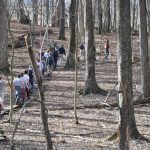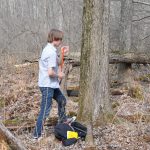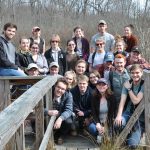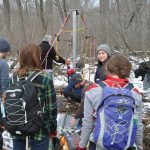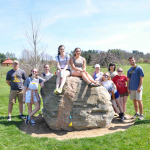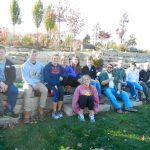Welcome to Paleoclimate (ESCI 270)
Lab Reports: We will have fieldtrips to collect samples and tour the landscape of NE – Ohio. These are listed in the syllabus. If you have conflicts let me know as soon as possible. We will be taking at least one trip when we will need to leave at 11 AM and will return at 4:00 PM. I will provide a yellow field notebook for our work outside and in the laboratory. Also for labs and trips bring your cameras and we will keep a running photo gallery for the class. This is fun to look at and the images can be used in reports and projects.
Testing, Projects and Presentations
Quizzes: I will give 10 quizzes over the course of the semester. Occasionally I will colllect the preparation questions as a quiz. I drop the lowest quiz grade – there are no makeup quizzes given.
Research project: You are required to choose a topic that you will write a 5 – page paper and present to the class during the final lab period. This can be further analysis of materials that we collect in the field (tree cores, sediment cores), it can be an analysis of a dataset available on the web, or some other topic of interest. I do expect a written page outlining your project and at least 5 references and a first draft of your paper 2. All final papers are due on the final day of class.
Presentations: You are required to give (2) informative 10-minute Powerpoint presentations to the class. These will be topics chosen from a sheet I hand out in class and will be concerned with the broad topics of Deep Time Examples of Climate Change, Dating Methods, and Climate Impact on Civilizations. These are important topics that we can’t do justice to during the course and so each of you will present some information on them.
Grading
Exams (3) 50%
Quizzes (10) 15
Project and presentation 20
Lab write-ups 15
Texts
The primary text is Paleoclimate by Michael Bender, as it turns out this is available through JSTOR here.
The other book is In Search of the Canary Tree: The Story of a Scientist, a Cypress, and a Changing World by Lauren Oakes, this is a new book that came out in Nov. 2018 and will provide background for a lab project on Alaska Yellow Cedar.
Teaching Assistant
Josh Charlton and ESCI major will be the TA for the course. Josh will help out in labs as well as give you a hand for logistics (powerpoint etc.) for class presentations.
Schedule Conflicts
The faculty of the College has recently approved a new policy regarding conflicts between extracurricular and academic events. The policy reads as follows: “The College of Wooster is an academic institution and its fundamental purpose is to stimulate its students to reach the highest standard of intellectual achievement. As an academic institution with this purpose, the College expects students to give the highest priority to their academic responsibilities. When conflicts arise between academic commitments and complementary programs (including athletic, cultural, educational, and volunteer activities), students, faculty, staff, and administrators all share the responsibility of minimizing and resolving them. As a student you have the responsibility to inform the faculty member of potential conflicts as soon as you are aware of them, and to discuss and work with the faculty member to identify alternative ways to fulfill your academic commitments without sacrificing the academic integrity and rigor of the course.”
Instructor
I have a weekly appointment schedule posted on my office door in Scovel 119. You can also contact me via email if you have any questions (gwiles).
Blogs
Sign up for the blogs Realclimate.org and Climate Audit. These are both worthwhile and are often at odds with one another. Also keep a close eye on the Wooster Geologists Blog.
Academic Honesty and the Code of Academic Integrity
The College’s understanding and expectations in regard to issues of academic honesty are fully articulated in the Code of Academic Integrity as published in the Scot’s Key and form an essential part of the implicit contract between the student and the College. The Code provides a framework at Wooster to help students develop their own personal integrity.
While you are a student at this college, you will be treated as an adult. You are expected to know and abide by the rules of the institution as described in the Scot’s Key and the Handbook for Selected College Policies. You should cite your sources to avoid plagiarizing ideas and text. Particular attention should be directed to the appropriate use of materials available on-line through the Internet. It is important that you read and understand the ethical use of information. Whether intentional or not, improper use of materials can be considered a violation of academic honesty.
Cheating in any of your academic work is a serious breach of the Code of Academic Integrity and is grounds for an F for the entire course. Such violations include turning in another person’s work as your own, copying or paraphrasing from any source without proper citation, going beyond what is allowed in a group project, fabricating excuses and lying in connection with your academic work. You will be held responsible for your actions. If you are unsure as to what is permissible, always consult your course instructor.
